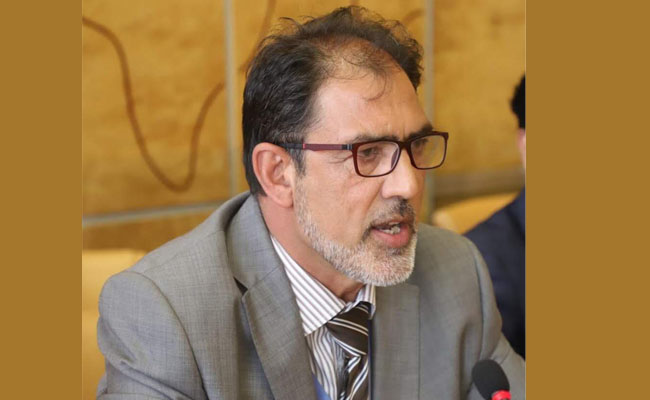Written By: Altaf Hussain Wani
Chairman Kashmir Institute of International Relations
5th February is the most a remarkable day in the history of Pakistan’s official response to the Kashmir struggle. It was on this day in 1991 when the entire Pakistani nation stood in solidarity with their Kashmiri brethren and millions of people right from Khyber to Karachi and Gilgit to Gawadar rallied on the streets of cities and towns to express camaraderie with Kashmiris’ legitimate struggle against the Indian occupation. It was the time when the Pakistani leadership from across the political spectrum rose above party politics and announced to become a voice for the voiceless Kashmiris; since then, the day, which is often referred to as Kashmir day, is being observed at the national level in Pakistan. This gesture of solidarity on the part of the Pakistani nation has always been a great morale-booster for the people in the occupied Kashmir.
As a matter of fact, February 5symbolizes Pakistan’s deep-rooted cultural and religious relationship with Kashmir and its people. While on the other it demonstrates the country’s earnest desire to seek a just and amicable solution of the long-running dispute in line with the Kashmiris aspirations to ensure durable peace and stability in the South Asian region. Pakistan’s urge for greater peace and prosperity and its commitment to a peaceful settlement of the Kashmir conflict has always been a dominating feature of its foreign policy. In pursuance of this policy, Pakistan has taken a number of initiatives to sensitize the international community about the dangers in Kashmir.
Especially, after the Indian government’s contentious move to annex the occupied Jammu and Kashmir, Pakistan despite facing multiple challenges both at internal and external fronts played a key role in bringing Kashmir into the international spotlight.
A meeting of the United Nations Security Council (UNSC) was sought with the help of a brotherly country (China) to address the simmering situation in the occupied Kashmir. As a result, an extraordinary in-camera meeting of the members of the Security Council was held to discuss the situation in the Indian-held territory of Jammu and Kashmir.
It was for the first time that the highest diplomatic forum met after the hiatus of nearly 50 years to discuss Kashmir. As a part of his governments extended diplomatic outreach Prime Minister of Pakistan Imran Khan and foreign minister Shah Mehmood Qureshi had some crucial meetings with leaders of influential world governments including the UN Secretary-General Mr. Antonio Gutters, wherein the PM reiterated Pakistan’s commitment to the peaceful settlement of Kashmir dispute and conveyed Pakistan’s serious concerns viz-a-viz the Indian government’s attempts to change the disputed nature of the occupied Kashmir.
In a bid to sensitize the the international community, Pakistan’s diplomatic missions abroad arranged seminars, symposiums and discourses to apprise the global community of the fast deteriorating political and human rights situation in the occupied territory of Jammu and Kashmir.
The OIC’s Emergency Foreign Ministerial Meeting on Kashmir was yet another successful attempt to expose Indian brutalities in Kashmir. Moreover, Pakistan took a strong exception to worsen the human rights situation in IoK and raised the issue vociferously during 42nd, 43rd and 44th session of the UN Human Rights Council at Geneva. Because of Pakistan’s offensive diplomatic campaign, threadbare discussions were held on Kashmir in the UK, French and the European Union parliament. Furthermore, a congressional hearing on Kashmir was held in the US, which called for an immediate end to the impending humanitarian crisis in Kashmir.
Pakistan’s efforts on the diplomatic front significantly contributed to galvanizing international support for the cause of Kashmir. Now that Kashmir is back on the international spotlight there is an urgent need that leaders on both sides of the aisle (government and opposition) must synergize their efforts to take the best advantage of this growing realization among world leaders about the peaceful solution of the Kashmir dispute. The leadership from across the political spectrum also needs to realize these changes sweeping across the globe. Since the issue of Kashmir has enjoyed unreserved support from all the governments and the entire nation there is dire need that in today’s polarized political environment this reality should be kept in mind to keep intact the nationwide consensus on the issue. No party whatsoever should use Kashmir as a stick to beat the government or ridicule political rivals; nor should it be used as a stunt in the elections. The insidious practice of taunting and blaming one another and doing politics in the name of Kashmir must stop forthwith. As it not only harms the spirit of greater unity and broader consensus on the issue within the country but also sends a bad message across the dividing line (LoC). Keeping it (Kashmir issue) above the party politics would certainly go a long way in sustaining broader consensus on the issue at national level. Rather than using Kashmir as an instrument of political point-scoring, the mainstream parties should join hands to evolve a comprehensive mechanism whereby this growing international awareness on the issue could be translated into an action to mitigate the suffering of the Kashmiri people.
The writer is chairman of Kashmir Institute of International Relations and Vice Chairman JKNF Can be reached at chairman@kiir.org.pk saleeemwani@hotmail.com
